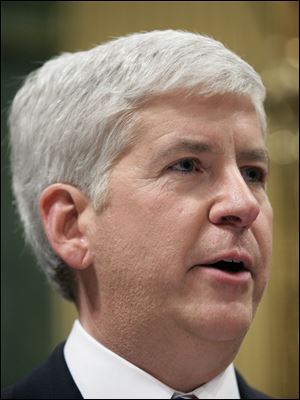
Mich. Governor Rick Snyder backs plan to give bankrupt Detroit $350M
Snyder, GOP lawmakers outline plan to help pension crisis, save city-owned art
1/22/2014
Visitors look at the Detroit Industry Murals by the Diego Rivera at the Detroit Institute of Arts.
ASSOCIATED PRESS

Visitors look at the Detroit Industry Murals by the Diego Rivera at the Detroit Institute of Arts.
Michigan Gov. Rick Snyder announced a plan today to commit $350 million in state funds to help shore up Detroit’s pension funds and prevent valuable city-owned art from being sold during the debt-ridden city’s bankruptcy.
The Republican joined legislative leaders in outlining a proposal that would provide the money over 20 years. They acknowledged it may be a hard sell in the GOP-controlled Legislature, but said it was better than a protracted legal fight in a city facing an estimated $18 billion in debt.
The governor was quick to say the money wouldn’t be a bailout, but rather a way to help Detroit settle its bankruptcy quickly and allow it to grow.
“If Michigan’s to be a great state again, we need Detroit on a positive path to success,” Snyder said.
The money would match the roughly $330 million that local and national charitable foundations have pledged so far to help the insolvent city, including protecting valuable works at the Detroit Institute of Arts that could be sold as part of the bankruptcy.
Before today, Snyder hadn’t talked much publicly about any potential state aid to Detroit, partly because discussions between the city and its creditors with federal mediators are private.

Michigan Gov. Rick Snyder
Snyder had privately gauged support among lawmakers last week for the plan — and he’s facing politically tricky terrain.
Some legislators are worried that state financial assistance to Detroit could set a precedent if other cities collapse, while others have their own spending priorities elsewhere in the state. Election-year politicking also could come into play.
Before today’s announcement, Republican Senate Majority Leader Randy Richardville said he liked the proposal but cautioned that the full Senate wasn’t yet on board. Richardville also it would not be a “bailout of Detroit at all,” but would rather help retirees who now live across the state.
“It does a lot to help people out, and I think it’s worthy of consideration,” said Richardville, who is from Monroe in the southeast corner of Michigan.
Detroit’s state-appointed emergency manager, Kevyn Orr, has said two pension funds are underfunded by $3.5 billion. A deal involving the state and charitable foundations would help retirees but probably would not cover all of their pensions.
Richardville declined to say if state aid also could be used to help with retirees’ health care costs. He gave no timetable for potential legislative action, but said it would be “sooner rather than later.”
“These are people that have earned a pension, have earned health care, and we’re going to do what we can to help them out,” Richardville said.
Sen. Bert Johnson, a Democrat who represents part of Detroit, also said the plan could prove to be a hard sell in the Legislature.
“Some very viable programs have been cut over the past three years,” he said.
Johnson said he wants to see specifics on how pensioners would be helped. He also wants assurances that control of pensions is vested with the city; Republicans have talked about outside oversight of what critics says are mismanaged funds.
“If this can be a major component of solving the bankruptcy and workers end up in a good position and the city of Detroit can walk away with a clean slate, it’s something we have a responsibility to look at,” Johnson said ahead of Snyder’s announcement.
Mediators between the city and its creditors said in a statement that they hoped Snyder’s announcement would help the parties reach as many agreements as possible that can be included in a plan to take Detroit out of bankruptcy.
“The mediators acknowledge that the question of state participation will now move to the legislative process, and urge that all parties approach the issue with an open mind,” they said.